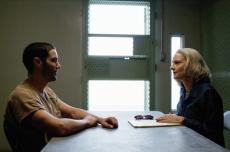「実際に起こった最悪の出来事や、人間が他の人にしてしまった最悪のことを理解しなければ、世界として前進することはできない。そうでなければ同じことを繰り返してしまう」ケヴィン・マクドナルド監督 『モーリタニアン 黒塗りの記録』インタビュー/Interview with Kevin Macdonald about “The Mauritanian”
NeoL / 2021年10月25日 17時0分
「実際に起こった最悪の出来事や、人間が他の人にしてしまった最悪のことを理解しなければ、世界として前進することはできない。そうでなければ同じことを繰り返してしまう」ケヴィン・マクドナルド監督 『モーリタニアン 黒塗りの記録』インタビュー/Interview with Kevin Macdonald about “The Mauritanian”
2001年9月11日に発生したアメリカ同時多発テロ事件から、今年で20年。事件の首謀者のひとりとして身柄を不当に拘束されたアフリカ・モーリタニア出身の青年、モハメドゥ・ウルド・スラヒの実話を描いた映画『モーリタニアン 黒塗りの記録』が10月29日より全国で公開される。原作は、スラヒがキューバのグアンタナモ米軍基地にある収容所から、その実情を発信した著書「グアンタナモ収容所 地獄からの手記」。アメリカ政府による検閲で大部分が黒く塗りつぶされた同書は大きな話題となり、ベストセラーを記録した。映画では、ジョディ・フォスターがモハメドゥを救うために闘う弁護士のナンシー・ホランダー役を演じ、ゴールデン・グローブ賞で助演女優賞を受賞。また、映画化を実現したプロデューサーでもあるベネディクト・カンバーバッチが、米軍側の弁護士スチュアート中佐役で出演も果たしている。メガフォンを執ったのは、アカデミー賞に輝いたドキュメンタリー『ブラック・セプテンバー/五輪テロの真実』や『ラスト・キング・オブ・スコットランド』を手がけたスコットランド出身のケヴィン・マクドナルド監督。映画の日本公開を控えた監督にリモート取材を行い、製作秘話やモハメドゥ本人とのエピソードなどを聞いた。
(→ in English)
――監督はモハメドゥ・ウルド・スラヒさんと実際にお話ししてから、本作を撮ることに決めたそうですね。
ケヴィン・マクドナルド監督「映画の製作を決める前に、まずはモハメドゥの著書(『グアンタナモ収容所 地獄からの手記』)を読みました。映画化権を所有していたベネディクト・カンバーバッチの製作会社のプロデューサーが本をくださったのです。興味深い内容でしたが、『世界はこれ以上、テロとの戦いやイスラムのテロについての映画を求めているのだろうか?』と思いました。すると彼らが、『とにかくモハメドゥと話してほしい』と。そこでモーリタニアにいる彼とZoomで話したところ、そのカリスマ性や怒りを感じさせない姿に魅了されてしまいました」
――彼との会話のどのようなところからインスピレーションを得たのですか?
ケヴィン・マクドナルド監督「あんなにもひどい経験をしたのに、彼は“許したい”と本気で決心し、日々その信念を守って生きていこうとしているのです。僕はその姿に強く心を打たれました。また、モハメドゥは大の映画好きなんです。グアンタナモの収容所では、看守たちがアメリカのコミックや映画のDVDを差し入れてくれたそうで、アメリカ文化のすべてを知ることができたといいます。『ビッグ・リボウスキ』は90回も観たのだとか。彼はある意味、アメリカが大好きなわけですが、それは並大抵のことではありません。アメリカの他の側面は嫌っているけれど、その文化は大好きなのです。それに、モハメドゥはとても面白い人でもあります。とても愉快であたたかいんです。類い稀な人物であり、類い稀なサバイバーだと思ったので、彼の物語を映画にしたいと考えました」
[caption id="attachment_109916" align="alignnone" width="2000"]

Habeas_31-01-20_2506.RAF[/caption]
――劇中のモハメドゥはとても魅力的な人として描かれていましたが、それは映画だからだと思っていたんです。でも、エンドロールで実際のモハメドゥさんの映像を観たら、劇中のモハメドゥよりもさらに明るい人に見えました。
ケヴィン・マクドナルド監督「そうなんです。彼には無邪気さがあって、それがとても魅力的なんですよね。彼は先日ロンドンに来たのですが、グアンタナモの受刑者の中で最初に旅することができたそうです。我が家に泊まって、うちの子どもたちとクリス・ロックのビデオを観て、本当に楽しい時間でした。モハメドゥはとても素敵な人です。そしてもちろん、大きなトラウマを抱えています。表面的にはわからなくても、大きな心理的ダメージを受けているのです。でも、彼はそれを見せないようにして、今この瞬間をポジティブに生きようと懸命に努力しています」
――初めてモハメドゥさんと話したとき、監督が一番知りたかったことは?
ケヴィン・マクドナルド監督「モハメドゥの人となりを感じ取りたいと思いました。この映画の主な目的は、イスラム教徒のテロリストという汚名を着せられた人物を人間らしく描くことです。彼は他の人と同じように人間であり、実際に素晴らしい人間で、観客が友だちになることを想像できるような人なのです」
――実在の人物を演じるのは難しいことだと思いますが、モハメドゥ役のタハール・ラヒムの演技は素晴らしかったです。
ケヴィン・マクドナルド監督「タハールは僕の友人です。僕たちは10年前に一緒に映画を作って、その後も連絡を取り合っていたのですが、当時の彼は英語が苦手でした。彼の英語はここ10年でどんどん上達したのです。この映画を製作しようと決めたとき、最初に頭に浮かんだのがタハールでした。なぜなら、彼にはモハメドゥと同じような資質があったからです。同じようにオープンで、同じようにあたたかくて、でも、良い人なのか悪い人なのか、ちょっとわからないような部分もあって。タハールにもどこか謎めいた部分があるんです。とてもカリスマ性があって、少しダークな一面もあるというか。それはタハールがブレイクするきっかけとなった素晴らしいフランス映画『預言者』で、特に顕著に現れています」
[caption id="attachment_109915" align="alignnone" width="1800"]

Habeas[/caption]
――ジョディ・フォスターは、彼女が出演しているだけで作品を観たくなるような役者ですよね。本作では、モハメドゥの弁護をしたことで多くのアメリカ国民から非難されたナンシー・ホランダー弁護士という難役を演じていますが、彼女とご一緒してみていかがでしたか?
ケヴィン・マクドナルド「ジョディは明らかに伝説的な存在ですし、一緒に仕事ができて信じられないくらい光栄です。タハールも他のみんなも同じ気持ちだったと思います。何十年にもわたって名作を生み出してきた人ですから。驚くことに、彼女はとても謙虚で、まったくスター気取りしないのです。巨大なエゴの持ち主でもないし、とても物静かな人です。何かしてほしいと頼むと、うなずいて実行してくれます。口論することもないし、癇癪を起こすこともありません。とても常識的で思いやりがあり、周りの人たちにも非常に寛大です。でも、彼女はナンシーの中に、少しだけ自分を見ていたのだと思います。ジョディには、かなり控え目で少しクールな一面があるのですが、それはナンシーも同じで、シンプルに人と友だちになることが非常に難しいそうです。ナンシーはとても率直な人で、ルールに縛られません。ストレートな人なのです。ジョディはナンシーのそのような部分に、大いに共感したのではないかと思います」
――ナンシー・ホーランダー弁護士は、ジョディ・フォスターが自身を演じるということについてどう感じていたのですか?
ケヴィン・マクドナルド監督「どうだったと思います?(笑) ナンシーは信じられなかったそうです。僕たちがジョディをキャスティングする前の週に、彼女は歯医者から、「映画を作るんだって? あなたの役はジョディ・フォスターが演じるべきだね」と言われたらしくて。その時点ではジョディが自分を演じることになるとは知らなかったので、実際にジョディに決まったと聞いて、すごくびっくりしていました」
[caption id="attachment_109917" align="alignnone" width="1440"]

Habeas_05-12-19_304.RAF[/caption]
――イギリス出身のベネディクト・カンバーバッチが、米軍の検察官であるスチュアート・カウチ中佐を演じると聞いて、少し意外な感じがしたのですが、見事な演技でしたね。
ケヴィン・マクドナルド監督「ベネディクトは素晴らしい俳優で、信じられないほどのスキルを持っています。あれほど素晴らしい俳優だと、どんな役でも演じられるんですよね。彼はプロデューサーの一人でもあり、本作を最初から最後まで支えてくれました。また、製作費を集めることが困難だった本作のために、自身の名声を役立ててくれたのです。ジョディや彼やシャイリーン・ウッドリー(弁護士のテリー・ダンカン役)やタハールのサポートがなければ、今日においてこのような映画を作ることはできなかったでしょう」
――多くのハリウッド映画では善と悪が明確に対立しているのに対して、本作の主な登場人物であるモハメドゥ、ナンシー、スチュアートは、それぞれが自身の信念のために立ち上がります。
ケヴィン・マクドナルド監督「僕はドキュメンタリー畑の出身なので、ハリウッドの伝統的な手法である白と黒、善と悪という観点から物語を見ることはあまりしません。なぜなら、現実にドキュメンタリーを手がけていると、誰もがその両面を持っていることがわかるからです。モハメドゥがいかに素晴らしくて興味深い人かということだけを描いても、観客は興味を持ってくれないでしょう。人はスターや親しみのある人に共感するよう洗脳されていますから。もちろん、だからこそ、ベネディクトやジョディやシャイリーンの存在が強みになるのです」
――なるほど。
ケヴィン・マクドナルド監督「それに、ジョージ・ブッシュに投票したような、アメリカの共和党の人々にも本作を届けたかったんです。もちろん、テロとの戦いに関しては、アメリカ人がすべて悪いわけではないですし、同じように、すべてのイスラム教徒が悪いわけでもありません。ですので、僕は正しいことをしようと立ち上がった2人のアメリカ人の姿を見せることで、奪われたのはシステムや政治であって、個人ではないということを示したいと思いました。もちろん、彼らは失敗したわけです。モハメドゥを釈放しようとしましたが、オバマ政権は勝訴した彼を7年間も収容所に戻してしまったのですから。アメリカやヨーロッパのリベラルな人たちは皆、オバマは正しいことしかしていないと思っています。実際には、スチュアート・カウチのような共和党員にも善人はいるし、このケースに関しては、オバマは悪役なわけです。とても複雑かつ倫理的な問題で、僕にとってはそれが興味深かったです」
[caption id="attachment_109919" align="alignnone" width="1900"]

Habeas_09-01-20_1199.RAF[/caption]
――目を背けたくなるようなシーンもありましたが、撮影していて一番苦労したことは?
ケヴィン・マクドナルド監督「一番大変だったのは収容所内での撮影でした。拷問のシーンだけに限らず、多くのシーンをカメラを置くスペースもないような狭い場所で撮影しなければならなかったんです。それにもちろん、終盤に行った尋問や拷問のシーンの撮影は本当に心が乱されました。タハールはかなり減量して挑んだのですが、彼は拷問のシーンで起こることを、あえて自ら体験したのです。実際に痛みを感じていましたし、空腹状態でした。狭い場所で大音量の音楽や照明を浴びることになり、あの週はスタッフにとっても、とてもつらい体験となりました。そこには、モハメドゥが体験したことの恐ろしさがはっきりと映し出されています。でも、僕は観客に現実を見てもらうことが重要だと感じたのです。拷問のシーンでご覧いただくことは、すべて現実に起こったことなのですから。観客が彼らの物語をきちんと理解し、起こったことの恐ろしさを理解するためには、それを追体験する必要があると思いました」
――完成した映画を観たモハメドゥさんの感想は?
ケヴィン・マクドナルド監督「モハメドゥは自らの物語を広めることができる本作を気に入ってくれました。そして、観客からの反応を求めています。TwitterやInstagramを通して届くメッセージがうれしいそうです。読者の皆さんも、もし映画が気に入ったら(モハメドゥに)伝えてあげてください。長い間、彼は発言することができなかったわけですが、この映画を通して声を得ることができて、それは彼の精神に大きな変化をもたらしました。とても気に入ってくれたとはいえ、モハメドゥにとっては観るのがつらい作品でもあります。最後まで通して観たのは一度だけだそうです。拷問のシーンまで観て、その後の部分も観たのですが、拷問のシーンは精神的な衝撃が強すぎるため、一度しか観ていないそうです」
[caption id="attachment_109920" align="alignnone" width="1900"]

Habeas_17-12-19_909.RAF[/caption]
――同時多発テロ事件から20年を迎えた今、本作を公開することにどのような意味を感じていますか?
ケヴィン・マクドナルド監督「今はあの時代の出来事が歴史になりつつある、興味深い時期だと思います。それはもう、僕たちの生きた経験ではなくなってきているのです。ですので、今はそれほど神経質になり過ぎず、少し客観的に捉えられる時代です。でも、実際に起こった最悪の出来事や、人間が他の人にしてしまった最悪のことを理解しなければ、世界として前進することはできないと思うんです。そういったことを理解しなければ、僕たちは将来的に同じパターンを繰り返してしまいますから」
――今後の予定は? 今はどのようなテーマに興味がありますか?
ケヴィン・マクドナルド監督「たくさんの作品を計画しているのですが、まだ次に何をするかははっきり決めていません。コロナや劇場の閉鎖など、映画業界は大きなストレスを抱えています。奇妙な時代ですが、僕の愛は映画にあるので、また別の作品を手がけたいと思っています」
text Nao Machida
『モーリタニアン 黒塗りの記録』
10月29日(金)TOHOシネマズ日比谷ほか全国ロードショー
監督:ケヴィン・マクドナルド『ラスト・キング・オブ・スコットランド』 『消されたヘッドライン』
出演:ジョディ・フォスター、ベネディクト・カンバ―バッチ、タハール・ラヒム、シャイリーン・ウッドリー、ザッカリー・リーヴァイ
原作:モハメドゥ・ウルド・スラヒ「モーリタニアン 黒塗りの記録」(河出文庫)
2021年/イギリス/英語・アラビア語・フランス語/129分/ドルビーデジタル/カラー/スコープ/5.1ch/原題:THE MAURITANIAN/G/字幕翻訳:櫻田美樹 配給:キノフィルムズ 提供:木下グループ © 2020 EROS INTERNATIONAL, PLC. ALL RIGHTS RESERVED.
STORY
2005年、弁護士のナンシー・ホランダー(ジョディ・フォスター)はアフリカのモーリタニア出身、モハメドゥ・スラヒ(タハール・ラヒム)の弁護を引き受ける。9.11の首謀者の1人として拘束されたが、裁判は一度も開かれていない。キューバのグアンタナモ収容所で地獄のような投獄生活を何年も送っていた。ナンシーは「不当な拘禁」だとしてアメリカ合衆国を訴える。時を同じくして、テロへの“正義の鉄槌”を望む政府から米軍に、モハメドゥを死刑判決に処せとの命が下り、スチュアート中佐(ベネディクト・カンバーバッチ)が起訴を担当する。真相を明らかにして闘うべく、両サイドから綿密な調査が始まる。モハメドゥから届く手紙による“証言”の予測不能な展開に引き込まれていくナンシー。ところが、再三の開示請求でようやく政府から届いた機密書類には、愕然とする供述が記されていた──。

――I read that you decided to make this film after you had talked to Mohamedou Ould Slahi?
Kevin Macdonald: I read his book before I decided to make the film, because the rights to the book were owned by Benedict Cumberbatch and his company, and his producer gave me the book. I read it and thought it was interesting, but I thought, “Does the world need another film about the war on terror, about Islamic terrorism?” They said, “Just speak to Mohamedou.” So I spoke to Mohamedou by Zoom when he was in Mauritania, and I was so captivated by him and his charisma, his lack of anger.
――What inspired you the most from that conversation with him?
Kevin Macdonald: He's made a real decision that he wants to forgive, and he tries to live by that every day. I was so struck by that, after everything that happened to him. And he's a big film lover. In prison in Guantanamo, he got to know everything about American culture because the guards would bring him American books and American movies on DVD. He's watched “The Big Lebowski” 90 times. So that's an extraordinary thing, he loves America in a way. He loves American culture, but he hates other aspects of America. He is also very funny. He is able to be very amusing and very warm. I thought that this is an extraordinary person, extraordinary survivor, and I would like to put his story on to film.
[caption id="attachment_109916" align="alignnone" width="2000"]

Habeas_31-01-20_2506.RAF[/caption]
――In the film, Mohamedou is depicted very charming, and I thought it’s only because it’s a movie. But at the end of the film, we get to see the actual footage of the real Mohamedou and he actually seems even more cheerful.
Kevin Macdonald: He is. He has this innocence to him that's very, very endearing. He recently came to London. He was the first Guantanamo inmate who was able to travel. He stayed with me, and my children hung out with him and watched Chris Rock videos with him. It was a lot of fun. He's a very lovely person. And you can also see there, of course, that he's very traumatized. Beneath the surface, there is a lot of psychological damage, of course. But he tries very hard to keep that invisible and to live his life in the moment positively.
――When you talked to him for the first time, what did you want to know the most?
Kevin Macdonald: I wanted to get a feeling for his character. The main aim of this film is to humanize somebody who is tarred as being a Muslim terrorist. He’s a human being like anyone else, and actually a magnificent human being, someone who the audience could imagine being friends with.
――It must be difficult to play in a biopic, especially when the topic is so recent like this one. But Tahar Rahim was great as Mohamedou.
Kevin Macdonald: Tahar is a friend of mine. We did a film together ten years ago and we've stayed in touch, but his English used to be very bad. Then over the years, his English got better and better. So when I decided to make this film, the first person I thought of was Tahar, because he had some of the same qualities, the same openness, the same warmth, but also there's a little part that you're not sure if he is bad or he is good. Something about Tahar, you're a little uncertain of him as well. He's very charismatic, but maybe a little darker side to him. You see that particularly in his first film which was his breakout performance. It was a French film called “Un Prophète” which is a wonderful film.
[caption id="attachment_109915" align="alignnone" width="1800"]

Habeas[/caption]
――Jodie Foster is someone who makes you want to watch the film as long as her name is on the poster. In this film, she plays the difficult role of Nancy Hollander, a lawyer who was condemned by many American citizens for her defense of Mohamedou. How was it like working with her?
Kevin Macdonald: She is obviously a legend, and it was an incredible honor really to work with her. I think Tahar felt the same way, everyone felt the same way. It's like working with someone who has made some of the great films of the last few decades. And she is surprising because she is very modest and very unstarry. She has not got a huge ego. She's very quiet. If you ask her to do something, she nods and she does it. She doesn't argue, she doesn't throw a temper tantrum. She's very reasonable and very thoughtful, and very generous to everyone else around her. But I think she saw in Nancy a little bit of herself. There's a side to Jodie which is quite reserved and a little cold. Nancy is like that and she finds it very difficult to be friends with people in a simple way. She is too direct with people. She doesn't play by the rules. She is a very straightforward person. So I think Jodie related to that, and in a big deal in a big way.
――How did Nancy Hollander feel about Jodie Foster playing herself?
Kevin Macdonald: What do you think? [laughs] She couldn't believe it. She said to me that the week before we cast Jodie, she went to see her dentist. And the dentist said to her, “Oh, you're making a film about yourself? I think Jodie Foster should play you.” At that time, she didn't know that Jodie was going to play her. So when she found out, she was so shocked.
[caption id="attachment_109917" align="alignnone" width="1440"]

Habeas_05-12-19_304.RAF[/caption]
――I was a little surprised when I found out that Benedict Cumberbatch was going to play American Marine Prosecutor Stuart Couch, but he was great.
Kevin Macdonald: He is a great actor and he is incredibly skillful. And I think when you are such a great actor, you could play almost anybody. He was one of the producers on the film and supported the film all the way through. And obviously again, he brought his own fame and his celebrity to help get this film made, because it wasn't an easy film to get the money for. So only by having his and Jodie's and Shailene Woodley’s and Tahar’s support, we could get a film like this made today.
――Whereas many Hollywood films have a clear depiction of good and evil, the main characters in this film, Mohamedou, Nancy and Stuart, each stand up for their own beliefs.
Kevin Macdonald: Because I come from documentaries, I don't tend to look at stories in terms of black and white, good versus evil in the Hollywood traditional way. Because in real life, when I'm doing a documentary, I know that everyone has both in them. And I think if I had made this film just about Mohamedou and saying what a lovely, interesting person he is, I don't believe that American audiences or international audiences would have cared, because people are brainwashed into relating to people who are stars or who they know about. Of course, that is the strength of having Benedict, Jodie and Shailene.
――I see.
Kevin Macdonald: Also, I wanted to reach the Republicans in America, the people who voted for George Bush. Of course, Americans aren’t all bad when it comes to the war on terror, in the same way all Muslims aren’t bad, either. So I wanted to show that it's the system and the politics that was robbed, but not the individuals by showing both of these American individuals who stood up to try and do what was right. Of course, they failed. They tried to release Mohamedou, but then the Obama administration put him back in prison for seven more years after he won his case. Everyone who is liberal in America and Europe thinks Obama did everything right. So to say actually there is a Republican like Stuart Couch, who is a good guy, but there is also Obama, who, in this case is a bad guy. It's very complex and ethical, and I think to me that's interesting.
[caption id="attachment_109919" align="alignnone" width="1900"]

Habeas_09-01-20_1199.RAF[/caption]
――There are a lot of scenes in this film that are hard to watch. What was most challenging filming?
Kevin Macdonald: Some of the most challenging things were just filming in the prison, not necessarily the torture, but filming lots of scenes in very tight spaces, where you don't have anywhere to put the camera. And of course, when we did the sequences of interrogation and torture right at the end of the filming, it was really upsetting doing it. He lost a lot of weight for that section. He deliberately put himself through a lot of the things that happen in the torture sequence. So he was in pain, he was hungry. We were in tight spaces with loud music and lights, and it was a very unpleasant experience for the crew for that week. There's a literal flavor for the horror of what this man went through. But it felt important to me for the audience to see the reality. Because everything that you see in that torture scene happened. So I felt like for the audience to really understand their story and understand the horror of what happened, they needed to go through that experience.
――What did Mohamedou think about the film when it's completed?
Kevin Macdonald: He loves the film because it's spreading his story, and he wants people to react to it. He loves it when people contact him on Twitter or Instagram. Tell your readers that they should (contact Mohamedou) if they liked the film. For so long, he's been without a voice and now he has a voice through the film, and it's really made a big difference to his spirit. So he loves the film, but of course, it's hard for him to watch it. I think he's only watched it all the way through one time. He's watched all the bits up until the torture and the bits after, but he's only one time watched the torture because it's too traumatic.
[caption id="attachment_109920" align="alignnone" width="1900"]

Habeas_17-12-19_909.RAF[/caption]
――What do you think it means to release this film now that this year marked 20 years since 9/11?
Kevin Macdonald: I think that we are now in an interesting point where this period of history is becoming history. It's not really our lived experience anymore. So it's the time now where it's not so sensitive, and people can see it with a little more objectivity. But I think we can't move forward as a world without understanding the worst things that have happened, the worst things that people have done to other people. Because without understanding those things, we will repeat the same patterns again in the future.
――What's next for you? What are some of the subjects that you're interested in at the moment?
Kevin Macdonald: I am developing lots of things but I'm not quite sure what I'm doing next. It's a strange time in film because film is under so much stress because of Covid and cinemas closing, but that's where my love is, so I hope to make another film.
text nao machida
関連記事のまとめはこちら
https://www.neol.jp/movie-2/
外部リンク
- 廃棄ビニール傘をアップサイクルする「PLASTICITY」、東京国際映画祭とのコラボレーションアイテムを発売
- 「実際に起こった最悪の出来事や、人間が他の人にしてしまった最悪のことを理解しなければ、世界として前進することはできない。そうでなければ同じことを繰り返してしまう」ケヴィン・マクドナルド監督 『モーリタニアン 黒塗りの記録』インタビュー/Interview with Kevin Macdonald about “The Mauritanian”
- 衆院選直前、菅政権の正体に迫った映画『パンケーキを毒見する』限定配信決定&選挙直前トークセッション
- Sister×P・グスマン監督最新作にしてチリ弾圧の歴史を描いた3部作最終章『夢のアンデス』コラボレーショングッズ発売
- ペドロ・アルモドバル監督、ペネロペ・クルスとミレナ・スミットによる新作映画『Madres Paralelas(原題)』
この記事に関連するニュース
-
この英語ってどんな意味?「 plot twist 」
OTONA SALONE / 2025年1月11日 7時0分
-
この英語ってどんな意味?「That’s life.」
OTONA SALONE / 2024年12月27日 17時30分
-
tHE GALLERY HARAJUKUにて、2025年1月2日(木)より、THEKLA KAISCHAURI個展「FRACTURED」を開催。
PR TIMES / 2024年12月25日 14時45分
-
UESHIMA MUSEUM ANNEX オープンのお知らせ ~ 2025年1月15日より、今津景展を開催
PR TIMES / 2024年12月23日 15時15分
-
この英語ってどんな意味?「apple of my eye」
OTONA SALONE / 2024年12月22日 7時0分
ランキング
-
1うどんVSそば 健康に良いのはどっち? 管理栄養士に聞いて分かった“摂取のメリット”
オトナンサー / 2025年1月11日 20時10分
-
2「4種類のマグロ」、どれが“値段が高い”か分かりますか?プロに聞く「マグロ」の見分け方
日刊SPA! / 2025年1月11日 15時54分
-
3日本プロ野球とMLBで広がる「経済格差」の残酷 メジャーリーガーになれば悠々自適ではない
東洋経済オンライン / 2025年1月12日 9時0分
-
4どんなにヤバい医者でも一生医者でいられる…それでも医師免許を「更新制」にしてはいけないワケ
プレジデントオンライン / 2025年1月11日 18時15分
-
5「正月だけで3キロ以上太った」衝撃の3割超! “正月太り”経験者の「罪悪感を持ちながらもつい食べ過ぎるもの」トップがリアルだった
オトナンサー / 2025年1月11日 21時40分
記事ミッション中・・・
記事にリアクションする
![]()
記事ミッション中・・・
記事にリアクションする

エラーが発生しました
ページを再読み込みして
ください










